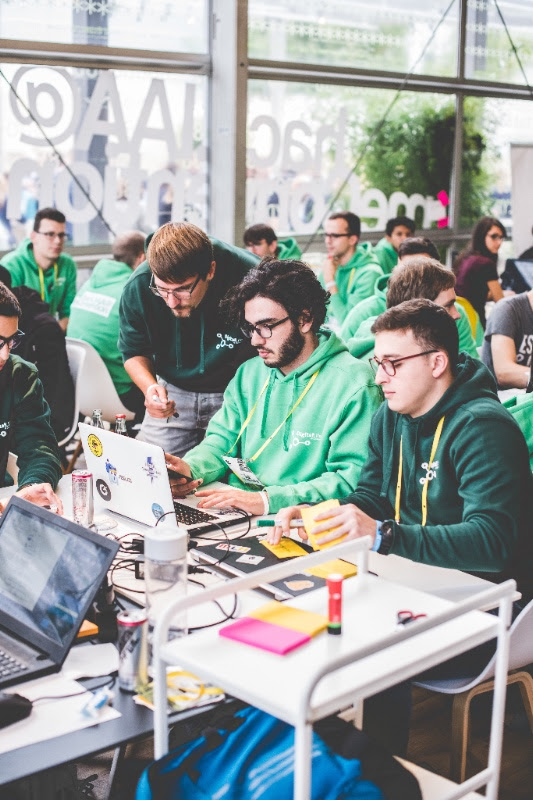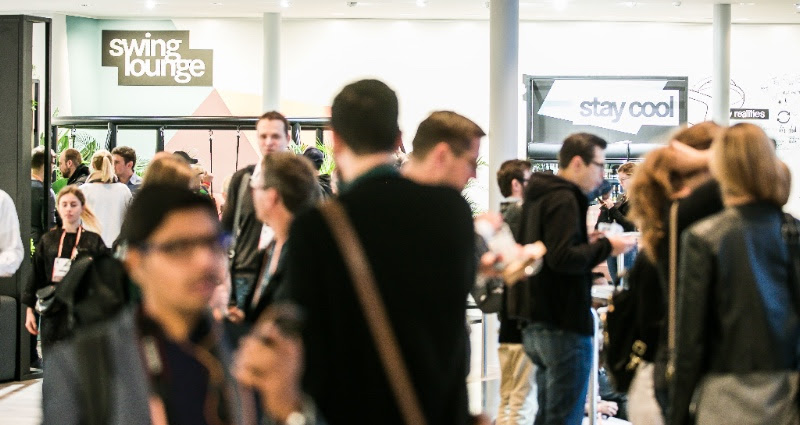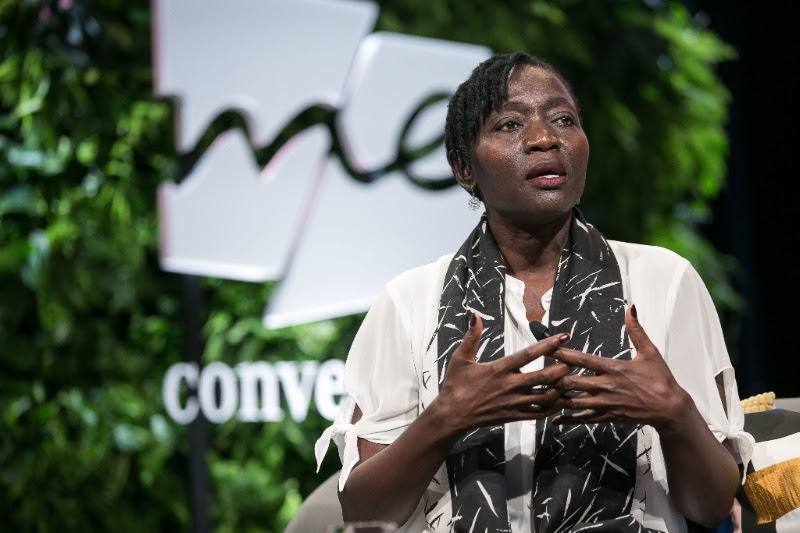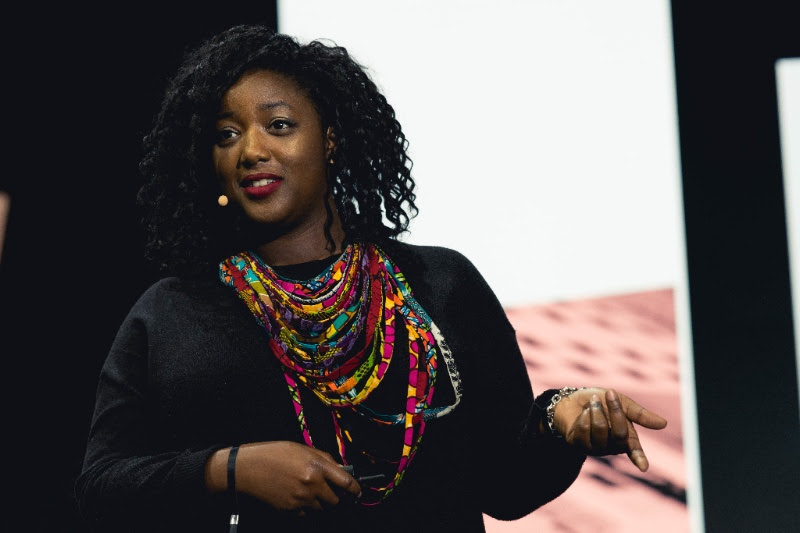Cyborgs and Game Changers
Day two at me Convention – the brand new future-driven conference organized by Mercedes-Benz and South by Southwest (SXSW) in Frankfurt – was packed with inspiration. Thought leaders such as cyborg Neil Harbisson and sociologist Auma Obama challenged our way of thinking; art influencer Hans-Ulrich Obrist painted his version of the future of the art world; and young hackers reinvented the way of unlocking cars.
Neil Harbisson: life as a cyborg
“I share a body part with insects, with all animals that sense infrared”, Neil Harbisson said about living with his antenna, a device permanently attached to his skull. “As a cyborg, I’m feeling closer to nature than to machines.”
Harbisson, who was born colorblind, decided to have the antenna implanted without legal regulations in place about a decade ago, breaking many boundaries and challenging common concepts of humans interacting with technology. His device, bending from the back of his head to his forehead, translates the dominant color in front of him into a specific sound, enabling him to identify fashion, food and even human faces in an entirely new way. “People who are white are actually very, very light orange”, Harbisson said. “People who are black are very, very dark orange. There is no black and white.”
His antenna, which is only the most visible part of an internet-enabled system connected to his brain, has been perceived as a reading light, mobile phone and selfie stick and frequently gets him in trouble at airports. Harbisson’s girlfriend has also become a cyborg, wearing various chips including a “bluetooth tooth” she shares with him. It sends and receives vibrations made by clicking teeth to the mobile phone, enabling the couple to communicate via Morse code. Harbisson has enabled five friends around the world to access his antenna device and send him sounds. He got hacked once, when a stranger sent him colors straight to his brain after he had been logged onto public wifi: “An interesting experience.”Now trying to establish a ‘Cyborg Foundation’ pushing for legal guidelines, Harbisson is permanently expanding the technical parts embedded with his body. His sound impression of me Convention: “C-sharp with a high pitch that gives you an alert.”
Auma Obama: “You don’t owe Africa anything”
Bringing politics to the me Convention stage, Auma Obama, founder and director of the Sauti Kuu (Kiswahili for ‘Powerful Voices’) Foundation and half-sister to former U.S. President Barack Obama, pointed out the opportunities and challenges for helping financially and socially disadvantaged children and youth through her work. Her mantra: “Opportunities are unlimited and poverty is no excuse.”
Obama, who resides in Kenia and holds a doctor’s degree in German studies, challenged the perception of Africa in the Western world. “You don’t owe Africa anything – except honesty and free trade”, she told the audience and suggested to remove the word “help” from the discussion about foreign aid. Obama cited the phrase ‘don’t give them fish – teach them how to fish’ which is commonly being used to describe Western development work, claiming it to be outdated. “Don’t give us fish. Don’t teach us how to fish. Ask us if we eat fish. That’s when you learn something.”
Anne-Marie Imafidon: teaching girls to become leaders
Disrupting biases and educational disadvantages is also the mission of Anne-Marie Imafidon, co-founder of Stemettes, a social enterprise encouraging girls from 5 to 22 years of age to pursue careers in Science, Technology, Engineering and Maths, or STEMs. Imafidon shared insights from a six week summer program where 115 young women from across Europe spent 24/7 under one roof and interacted with STEM leaders and investors to create startup ideas, develop leadership skills and become role models. “Surprisingly, altruism was their main topic”, Imafidon said. “All the girls gravitated towards problems that others had. Societal problems.”
Their startup ideas ranged from curing allergies to finding e-car charging stations, from improving homework to confront bullying. Many of the participants have since moved on, building out their startups, giving public speeches and inspiring others. Imafidon concluded: “The future of innovation is not just bigger, better, faster. It’s also about solving real problems.” Girls and young women are already the changing the face of innovation.
The future of art I: Hans Ulrich Obrist
Well-known curator and art scene networker Hans Ulbricht gave an insight into his journey from a young art enthusiast curating his first art show in his kitchen – “27 people attended”, he remembered – into a globally working and thinking influencer who defines the future of his industry.
To explain how his own profession as a curator has evolved from taking care of dead objects to actively creating connected spaces for art, Obrist showed his Instagram account. “First, I didn’t know what to post. I didn’t want to post selfies, I didn’t want to post food, or artist’s studios.” Then he discovered handwritten art by befriended artists as a way to fill his feed and also drive a mission: fighting the disappearance of handwriting in the digital age. Through this approach, his Instagram account has become a daily gallery with handwritten works from world famous artists, ranging from Olafur Eliasson to Zaha Hadid, and almost 200.000 followers. “We can now all do our own museum in a DYI way”, Obricht said, stating that useful art – entering social and political spaces, supported by digital tools – in his view is still the most future-oriented.
The future of art II: transforming museums
A cross-disciplined panel discussion on the future of museums added a different perspective on art in the digital age. The panelists described how big tech firms such as IBM and Google have started to embrace art institutions, bringing their deep learning and artificial intelligence tools into places formerly used to archive objects.
“I don’t want to live in a world only created by engineers. We need artists to play with it”, said Sophie Lamparter from swissnex San Francisco, Switzerland’s innovation outpost in the Silicon Valley. “And the big tech companies have understood that demand”, she added. Co-panelist and museum futurist Jim Richardson argued that tech firms largely benefit by the publicity they receive through museum collaborations, but also incentivize museums to transform into workplaces for digital entrepreneurs themselves. New York City’s New Museum has opened its own incubator for startups, while the Australian Center for the Moving Image has invited engineers into a newly built co-working space. As “most museums still don’t know what their mission is”, Richardson said, becoming a testing ground for new ideas in the digital age is a promising proposal.
Hackathon: Unlock your car with your face
At me Convention, there was also innovation happening in real time. With Hack.IAA, the globally successful “DigitalLife Campus” hackathon series by DigitalLife@Daimler entered a new cycle. Dozens of young developers put their heads together for a 24-hour challenge to improve current car consumer technologies using artificial intelligence. Three ideas were judged in a final competition: A live object detection through low-cost car cameras; a keyless access to cars using face recognition; and a chatbot helping customers to customize their dream car. The winning idea, chosen by a jury of industry insiders, was car2go Airkey, which helps the user to unlock his car2go even if there is no smartphone or keycard around. With face recognition technology, developed by the young engineers to full functionality through a neural network trained with over three million images, the car door can be unlocked by showing their face to a small camera pointing out the window. The winning team received a ticket to Web Summit in Portugal, one of the largest tech conferences in the world – and was celebrated with ovations from the crowd of me Convention and IAA attendees.




_________________________________________________________________
BECOME A PART OF THE STARTUP COMMUNITY IN FRANKFURT/RHEIN-MAIN!
Stay up to date at Facebook, Twitter or through our rss feed. Talk to other local founders in our facebook group or our Slack (short email to rheinmainstartups@gmail.com and you’ll receive an invite). You can also write a guest post or send us information about your startup.
OUR SPONSORS:


Sunday Briefing - Dein kostenloser Newsletter aus dem Startup- und Innovations-Ökosystem FrankfurtRheinMain direkt ins Postfach.
